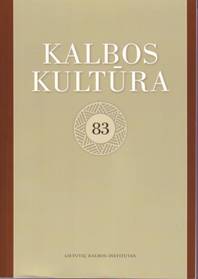Jonas Jablonskis ir lietuvių spaudos draudimas
Jonas Jablonskis and the ban of the Lithuanian press
Author(s): Vitas LabutisSubject(s): Baltic Languages, Pre-WW I & WW I (1900 -1919)
Published by: Lietuvių Kalbos Institutas
Keywords: Jonas Jablonskis;
Summary/Abstract: Jonas Jablonskis is remembered as a cherisher of Standard Lithuanian and creator of our prescriptive grammar yet he also deserves credit as a public figure and fighter for the Lithuanian ideals and rights of the Lithuanian language. His resolution to foster and protect the Lithuanian language meant that he had to oppose the disastrous intents of the Russian administration, particularly as regards the ban of the Lithuanian press, and also the pervasive influence of polonization among the landowners, the clergy and ordinary people. As a student, at the University of Moscow J. Jablonskis joined a circle of patriotically minded Lithuanianstudents who aspired to awaken the Lithuanian national ideals and after his studies he never gave up this path but rather propagated the Lithuanian identity in his pedagogical and research writing. In the articles published in the liberal Russian press, he tried to prove that the Russian alphabet was inadequate for the transcription of the Lithuanian sounds by this demonstrating both his philological education and good orientation in the socio-political reality of Lithuania. He was also publishing texts in the illegally published Lithuanian press, e. g. the magazine Varpas, contributing to its distribution, keeping contacts with so-called book-smugglers, or illegal distributors of the written Lithuanian word, taking part in secret meetings etc.More than once J. Jablonskis fell victim to the discriminating tsarist regulations and repressions: after graduation for several years he could not get a teacher’s job in Lithuania, he was constantly persecuted by the police after his family had become the centre of the Lithuanian community in Mintauja, and finally he was transfered to Tallinn (Estonia) to keep him away from Lithuania and sever his ties with the country. In 1900, his home in Tallinn was searched by the police, some “evidence” was found and charges were brought. As a consequence, he had to leave his teaching job while the case was taken up by the prosecutors in St. Petersburg. Despite the attempts of his Russian colleagues and academicians, namely, F. Korsh, F. Fortunatov, A. Shachmatov, V. Lamanski, to stop the proceedings and acquit Jablonskis, the linguist was sentenced to deportation for two years. Luckily, in 1903 he was granted a permission to move from Pskov in Russia to Šiauliai (Lithuania).In the aftermath of the persistant and long opposition of Lithuanians, which had been supported by the educated Russian people, and revolutionary movements in the tsarist empire, the ruling Russian administration decided to lift the ban on the Lithuanian press on 7 May 1904. Undoubtedly, the work and fight of J. Jablonskis had also contributed to this. The press became legal yet the Russian censorship remained since Lithuania was still a part of the Russian empire. J. Jablonskis was particularly concerned about the status of Lithuanian in schools and,more generally, in public life. In his endeavours to strengthen the status of the language, he faced two major threats: the reviving polonization and the continued Russian unwillingness to accept the independence of Lithuania.
Journal: Bendrinė kalba (iki 2014 metų – Kalbos kultūra)
- Issue Year: 2010
- Issue No: 83
- Page Range: 19-29
- Page Count: 11
- Language: Lithuanian

